Westfront 1918 Blu-ray Movie
HomeWestfront 1918 Blu-ray Movie 
Westfront 1918: Vier von der InfanterieCriterion | 1930 | 97 min | Not rated | Jan 30, 2018
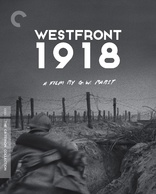
Movie rating
6.9 | / 10 |
Blu-ray rating
| Users | 0.0 | |
| Reviewer | 4.0 | |
| Overall | 4.0 |
Overview
Westfront 1918 (1930)
Four infantrymen on the Western Front suffer the everyday hardships and insanity of trench warfare.
Starring: Fritz Kampers, Gustav Diessl, Hans-Joachim MŲbis, Claus Clausen, Jackie MonnierDirector: Georg Wilhelm Pabst
| Foreign | Uncertain |
| Drama | Uncertain |
| Romance | Uncertain |
| War | Uncertain |
Specifications
Video
Video codec: MPEG-4 AVC
Video resolution: 1080p
Aspect ratio: 1.19:1
Original aspect ratio: 1.2:1
Audio
German: LPCM Mono (48kHz, 24-bit)
Subtitles
English
Discs
Blu-ray Disc
Single disc (1 BD)
Playback
Region A (locked)
Review
Rating summary
| Movie | 4.0 | |
| Video | 4.5 | |
| Audio | 4.0 | |
| Extras | 4.0 | |
| Overall | 4.0 |
Westfront 1918 Blu-ray Movie Review
Reviewed by Dr. Svet Atanasov February 19, 2018G.W. Pabst's "Westfront 1918" a.k.a. "Westfront 1918: Vier von der Infanterie" arrives on Blu-ray courtesy of Criterion. The supplemental features on the disc include new interview with Jan-Christopher Horak from UCLA Film & Television Archive; archival episode of the French television show Les dossiers de l'ecran; new documentary about the restoration and reconstruction of the film; and more. In German, with optional English subtitles for the main feature. Region-A "locked".
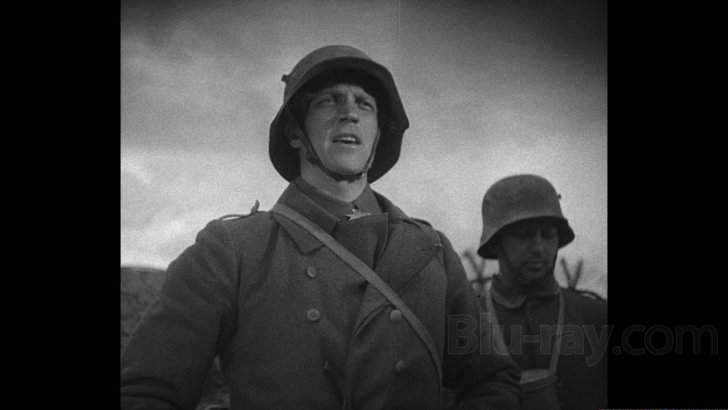
Any volunteers?
G.W. Pabstís first sound film, Westfront 1918, carries the same message that Lewis Milestoneís legendary film All Quiet on the Western Front does: war is madness.
The bulk of Pabstís film has the raw appearance of a documentary feature. As World War I intensifies, the camera looks in all sorts of different directions to capture the chaos and blood-curdling carnage that people have been forced to endure. Sometimes the intensity of the random fights is so overwhelming that it almost looks as if the soldiers on both sides of the barb-wired trenches are lunatics who have somehow managed to get away from a mental institution.
The breaks between the fights are just as random and borderline surreal. Early into the film a group of German soldiers gather in an old cabaret to enjoy an improvised play by two aging comedians who have been tasked to temporarily make them forget the madness. Their play is poor, but with death lurking around the corner it feels brilliant and the spectators are thankful to be able to hear a few genuine laughs again. Then, just as abruptly, the soldiers are sent back to the front and the fighting resumes.
The creepiest segment is the one where the soldiers in the trenches begin choking after their enemies unleash a deadly gas. A few manage to put on their gas masks and reach the underground shelters, but there are many that are not that lucky. The ensuing silence is bone-chilling.
The one character that the camera eventually chooses to follow closely is Karl (Gustav Diessl), a tall and handsome German soldier who earns the right to go back home for a few days. The long journey is exhausting but he can barely wait to reunite with his wife and see his mother again. However, when he eventually reaches his home he discovers his wife (Hanna Hoessrich) in their bed with another man. He then refuses to forgive her even though she does her best to explain to him that she had to do it for food.
The most profound difference between Pabst and Milestoneís films is in the manner in which they choose to incorporate melancholy in their narratives. In Pabstís film its role is practically meaningless as there is only one very small segment where its presence is truly felt, which comes right after the disillusioned Karl announces to his heartbroken wife that it is time for him to head back to the front. Right here there is a whiff of melancholy that temporarily erases the heavy presence of the madness that is destroying just about everything that the camera looks at. His country might be going to Hell, but Karl no longer cares because he has already lost his wife. In Milestoneís film the melancholy is an integral element of the atmosphere that defines it.
*Westfront 1918 is based on Ernst Johannsenís popular novel. After Hitler and his National Socialists came to power, the novel and Pabstís film were quickly banned.
Westfront 1918 Blu-ray Movie, Video Quality 
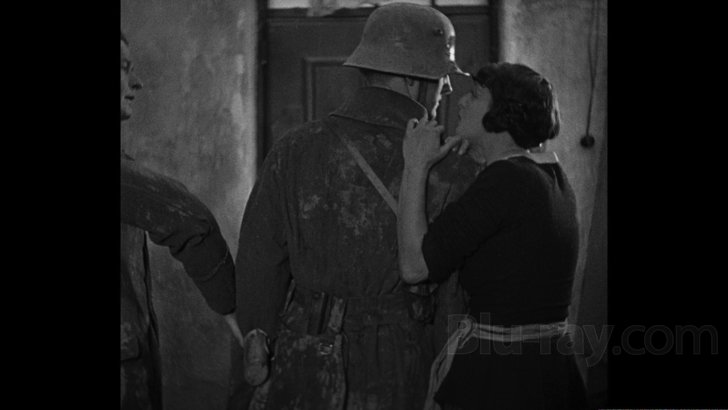
Presented in an aspect ratio of 1.19:1, encoded with MPEG-4 AVC and granted a 1080p transfer, G.W. Pabst's Westfront 1918 arrives on Blu-ray courtesy of Criterion.
The following text appears inside the leaflet provided with this Blu-ray release:
"This 2014 restoration by Deutsche Kinemathek was undertaken from a transfer created in 2K resolution on a C-Reality film scanner from a 35mm duplicate positive held by the British Film Institute and a 35mm duplicate negative from Praesens-Film AG. The monaural soundtrack was remastered from the same elements.
Restoration supervisor: Martin Koerber/Deutsche Kinemathek.
Restoration technician: Julia Wallmuller/Deutsche Kinemathek.
Transfer supervisor and colorist: Thomas Bakels/Alpha-Omega digital GmbH, Munich.
Image processing and restoration: Marie Bendl//Alpha-Omega digital GmbH."
Time has obviously left its mark on Westfront 1918, so the restoration actually involved a fairly large amount of reconstruction work. However, the end result is very impressive, though as far as I am concerned this is anything but surprising. Indeed, as soon as I saw that Mr. Bakels was involved with the project I knew that all efforts have been made to get optimal results. (For reference, Alpha-Omega was the German company that, under Thomas Bekels' supervision, produced this magnificent restoration of Ernst Lubitsch's film The Loves of Pharaoh.
Despite some minor density fluctuations that are introduced by native source limitations, depth and clarity remain very pleasing. In fact, there are larger portions of the film where depth is actually quite impressive. I expected to see the most obvious limitations during the nighttime/darker footage, but stability and overall quality there are very good; only during the final third there are some thicker than usual visuals where blacks and shadow definition are not optimal. There are no traces of problematic degraining or sharpening adjustments; the digital work that was performed to stabilize and rebalance the film as best as possible is very convincing. Lastly, it was easy for me to see that a lot of work was also done to removes as many traditional age-related imperfections as best as possible. Well done. (Note: This is a Region-A "locked" Blu-ray release. Therefore, you must have a native Region-A or Region-Free player in order to access its content).
Westfront 1918 Blu-ray Movie, Audio Quality 
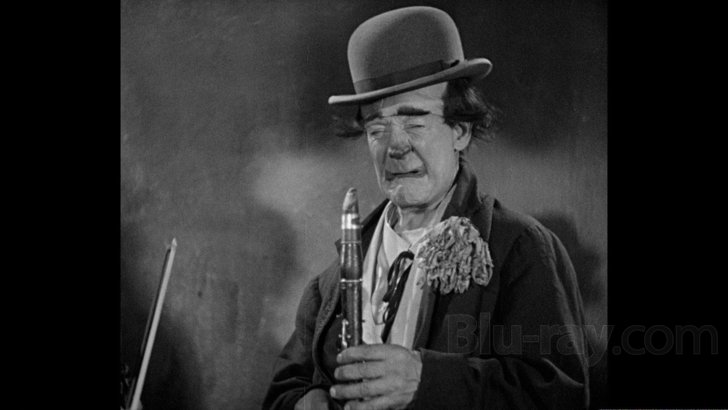
There is only one standard audio track on this Blu-ray release: German LPCM 1.0. (with a few short exchanges in French). Optional English subtitles are provided for the main feature.
The recording equipment is undoubtedly responsible for some of the 'thinning' and clipping in the high-frequencies, so when you view the film and you feel that during the battle footage the audio ought to be better rounded and fuller this is the reason for the overall unevenness. On the other hand, there is no doubt in my mind that some conventional aging has also had an impact on the overall quality of the audio. The current remastering job, however, is convincing.
Westfront 1918 Blu-ray Movie, Special Features and Extras 
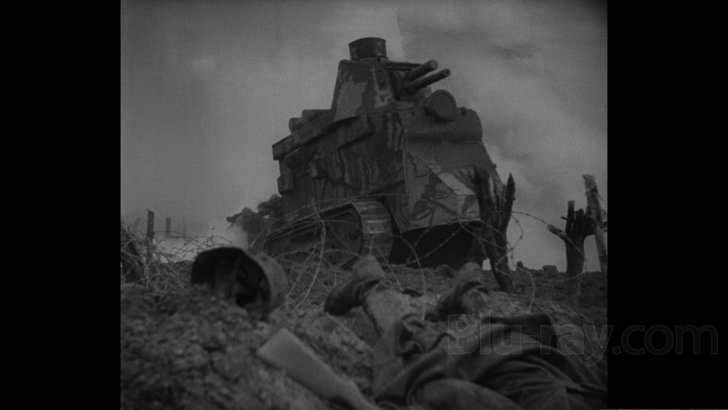
- Restoration Demonstrations - this is an excellent documentary that highlights the many obstacles that Martin Koerber and his colleagues at Deutsche Kinemathek had to overcome during the restoration and reconstruction of Westfront 1918. In English, not subtitled. (9 min, 1080p).
- Les dossiers de l'ecran - presented here is an archival episode of the French television show Les dossiers de l'ecran in which a group of French and German war veterans recall their experiences during the Great War after a screening of Westfront 1918. The episode was broadcast on November 12, 1960, In French, with optional English subtitles. (72 min, 1080i).
- Jan-Christopher Horak - in this video interview, Jan-Christopher Horak, director of UCLA Film & Television Archive, discusses the evolution of G.W. Pabst's career and the important role that Westfront 1918 occupies in his body of work. The interview was conducted in 2016 for Fiction Factory. In English, not subtitled. (18 min, 1080p).
- Jean Oser - presented here is a collection of short responses by Jean Oster, the editor of Westfront 1918, which he recorded for film scholar Hermann Barth in 1988. In German, with optional English subtitles. (3 min, 1080p).
- Leaflet - an illustrated leaflet featuring author and critic Luc Sante's essay "War is Hell", as well as technical credits.
Westfront 1918 Blu-ray Movie, Overall Score and Recommendation 
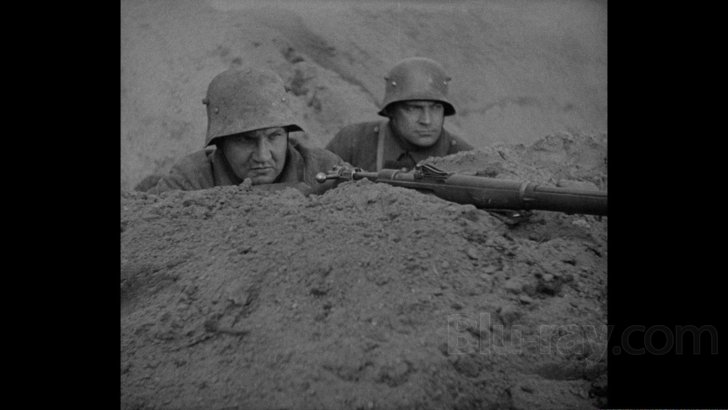
All great war films have the same message, which is that war is madness that produces only losers. G.W. Pabst's first sound feature, Westfront 1918, is another one of those films that emerged at approximately the same time that Lewis Milestone's legendary film All Quiet on the Western Front did. It has been recently restored and reconstructed by Deutsche Kinemathek in Germany, and l think that the current presentation will probably remain its definitive presentation on the home video market. HIGHLY RECOMMENDED.
Similar titles
Similar titles you might also like

The Cranes Are Flying
Летят журавли / Letyat zhuravli
1957

Red Angel
赤い天使 / Akai tenshi
1966

Many Wars Ago
Uomini contro
1970

Shame
Skammen
1968

Senso
Italian and English Versions
1954

La Grande Illusion
Grand Illusion
1937

A Very Long Engagement
Un long dimanche de fianÁailles
2004

Ivan's Childhood
Ива́ново де́тство / Ivanovo detstvo
1962

The Bridge
Die BrŁcke
1959

The Front Line
고지전 / Go-ji-jeon
2011

Wooden Crosses
Les croix de bois
1932

Lebanon
2009

A Special Day
Una giornata particolare
1977

Ballad of a Soldier
Баллада о солдате / Ballada o soldate
1959

Hiroshima mon amour
1959

Fires on the Plain 4K
野火 / Nobi
1959

Story of a Prostitute
春婦伝 / Shunpu den
1965

Frantz
2016

City of Life and Death
南京!南京! / Nanjing! Nanjing!
2009

Stalingrad
1993